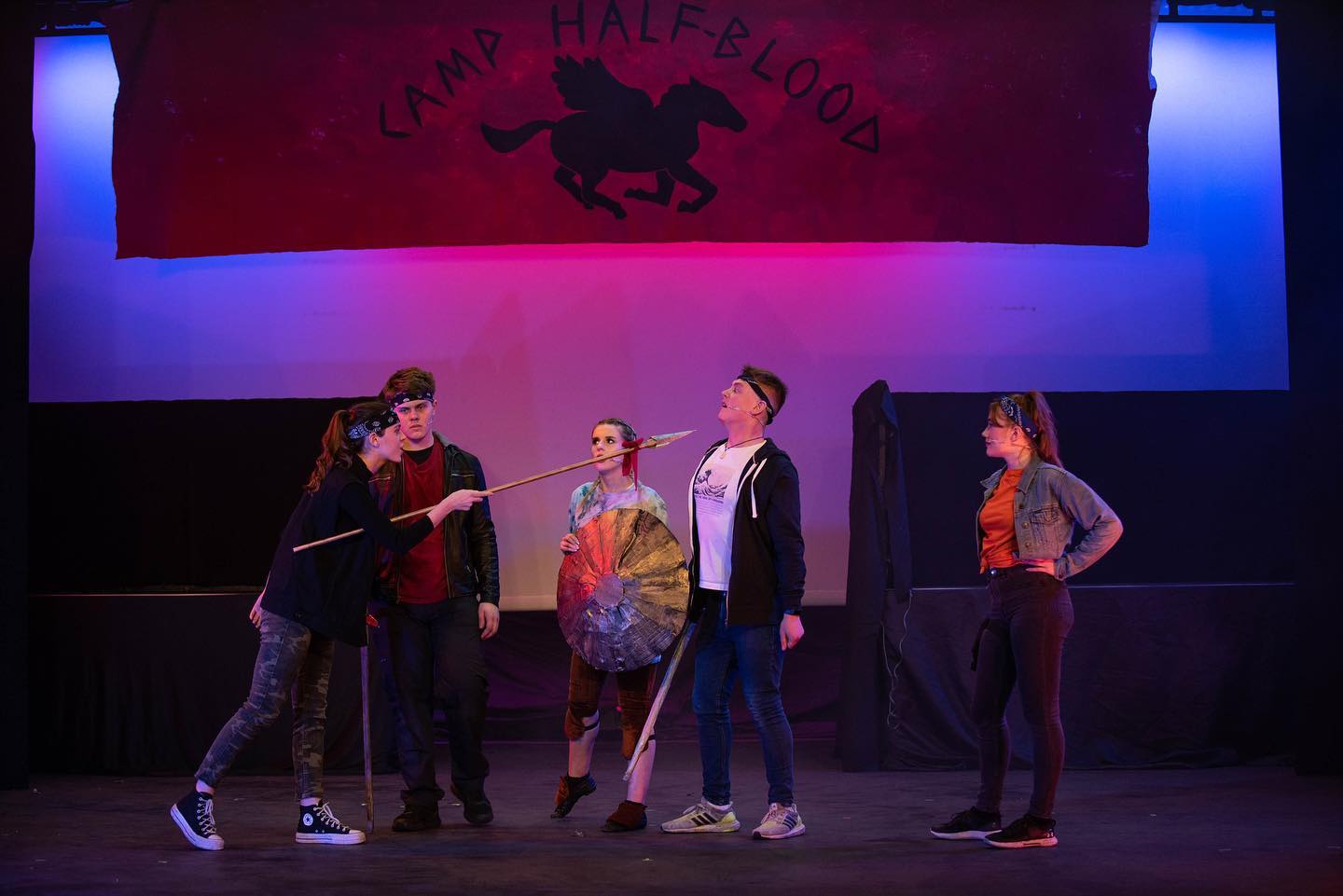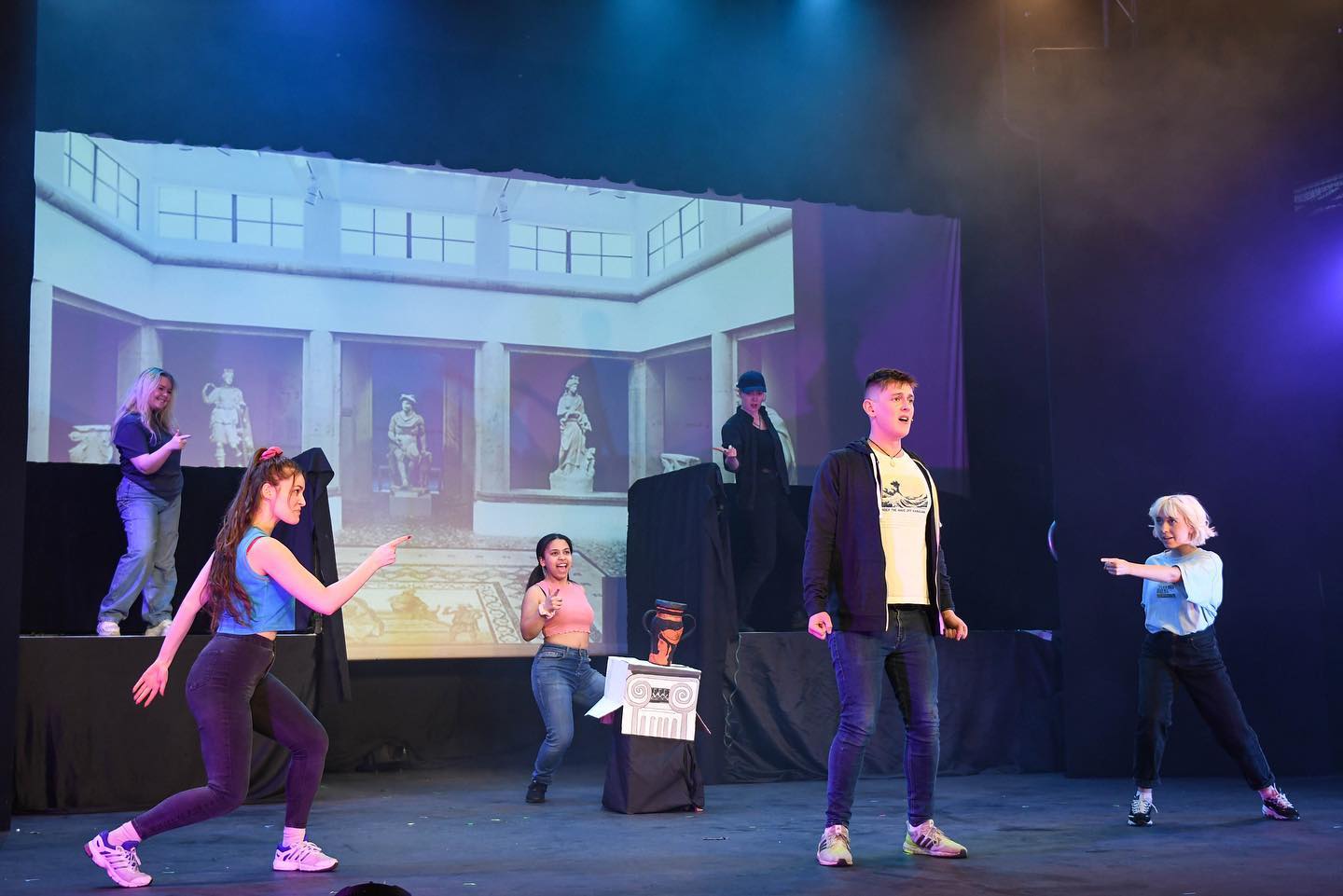
LAMMPS’ ‘The Lightning Thief’ Uplifts & Entertains
The Lightning Thief by LAMMPS (Leeds Amateur Medics Musical & Performance Society) honours Rick Riordan’s classic tween novel whilst securing many laughs in this upbeat, accomplished and tightly packed full of talent, musical adaption. A constant pace and an entire cast consisting of strong singers means this European musical debut showing at Riley Smith Theatre is a definite success. Lightness and laughter results in a highly watchable production which brings out warm fuzzy feels and above all funny, feel-good storytelling.
Rick Riordan’s smash hit and seriously good first Percy Jackson novel merits exactly the style of musical treatment which LAMMPS delivered: enthusiastic, occasionally sincere, consistently technically adept, and subtly self-aware throughout. Starting the musical with characters singing doing simplistic chorography conveying how they feel, created both familiarity and informality. Percy Jackson’s central theme is the plight and yearning of its underage ‘demigods’ – whimsically explained through song – and songs were the perfect vehicle to feature these individual tales succinctly and interestingly. There were no overpowering Ancient Greek style narrators, instead where production and cast truly showed off, was in the action.

Tone established, Cameron Mullin who superbly realised twelve-year-old Percy Jackson, was an asset to the production with his rousing vocal ability, comedic knowhow, and solid characterisation. Present in nearly every scene, Mullin’s energetic eyes, impressive clarity of diction in speedy American-accented singing and easy rapport with others meant the zany two-act show went on without drag. As Mullin was always in character as the fictional baby of the cast, the child, the show could diverge elsewhere in approach whilst retaining its heart. Percy was the one who exhibited realistic character growth. Mullin’s restless cartoonish zeal – awkward arms and splayed hands – did not disappear but as shown from the Act 1 finale and onwards, he matured. In this believable, intriguing world, an updated mythological twist of good versus evil, the main character needed the most humanity to sell this implicit coming-of-age story.
Alongside Percy, the cast had a winning combination of protagonists, main characters, cameo characters, and principals. This meant there was a variety of visual feasts in the foreground, background, and stage scenery whenever the ensemble cast united to tell fabulous mini stories. An assured use of staging levels meant minor characters could visually represent flashbacks, points or illusions which was not overdone nor distracting. The Lightning Thief made complete sense as a musical when its main Camp Half-Blood setting was revealed; its happy, youth-orientated songs reflective of any summer camp. The contrasting colour scheme of ocean blue and contrasting heroic orange was smartly utilised in stand-out moments where chromatic seas of bodies flowed elementally across the stage. The costumes further in flourishes, grouped the classical and ‘70s disco, which together with particular plot-points, gave the performance a groovy surface. The cast’s collective silliness effectively undercut impressive, earnest main characters.

Also, the large cast enabled scene-stealing characters to return later to the proceedings to big cheers from the lively audience. Grumbling head of camp Mr. D, Cara Staniforth, jazzed it up hilariously whilst Percy’s other teacher Mr Brunner, Henry Marshall, brought paternal concern and physical humour. Smooth-talking Poseidon, Abraham Sondhi, boastfully gruff Ares, Ciara Devlin, and delightfully upfront Hades, Kayleigh Corbin, made the gods useless parents and adults. These camp, colourful characters returning on stage led each time to a bit of Bacchanalian bravado – a cheeky nod and a cheekier shimmer – but most importantly, the cast knew to reign it in.
The directorial decision by Ruth Rusnak to allow laughs, but not to indulge in sending-up characters, paid off in a funny but never deliberately provocative show. Actors were kept at their best in a production which was like a zippy train, a forceful motion periodically aided by the intelligent use of a well-timed projected screen. A small criticism would be that some songs intrinsically were too expositional, a breathless way to communicate a book’s plot. When the plot slowed down, the songs soared, and this was when Niamh Robinson’s ensemble chorography triumphed. Charon’s, Adele Kirby, tour of the underworld and the catch-the-flag songs, were wow moments for all involved.
As well as the great lead, integral to the story’s smooth running were the other brilliantly acted members of the main trio: Natalie Hall playing Annabeth and Grover as Mya Lane. Best friends Percy and Grover’s friendly chemistry was an underlying strength and Hall impeccably brought out Annabeth’s nuanced bright nature. Both carried scenes and sang fantastically throughout. Luke played by Zak Muggleton impressed with his rich voice and dimensionality. Whilst Percy’s mom Sally portrayed by Leah Greenman acted and sang with beautiful tenderness, pivotal for the show’s emotional appeal. The performance was kept buoyant by constant comedy and elevated by main characters who sang their way past relatability and into enticing, truthful characters.
Incredible leads, a cohesive cast, and considerable humour makes LAMMP’S The Lightning Thief a victory for musical theatre adaptations. A must-watch production for the family and as shown here, for students.
Cover image courtesy of LAMMPS

